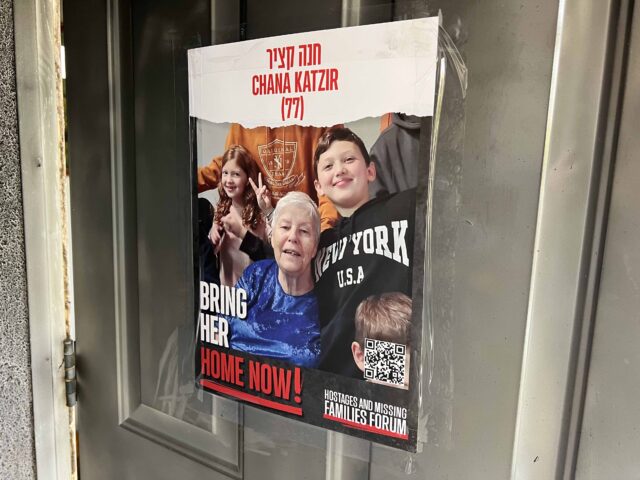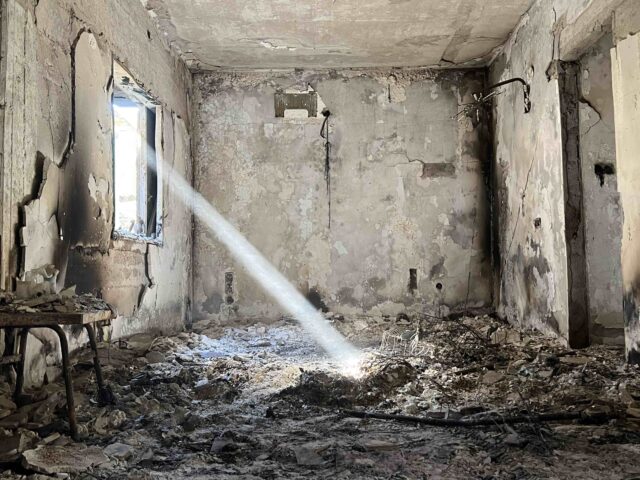LOS ANGELES, California — I concluded my second wartime visit to Israel this week with two overwhelming feelings. The first, as before, is a deep admiration for the way Israelis have come together to confront the threat of terror.
Political divisions have been set aside. Reservists have flocked to the front to fight. Volunteers work daily to harvest fields and to prepare meals for the needy. Artists have written new songs to express collective feelings of unity. Flags are flying everywhere.
In that sense, Israel has won.
Anti-Israel activists who paraded on city streets and college campuses worldwide in the aftermath of October 7 celebrated the terror attack because they believed that the videos of Israelis running for their lives from murderous terrorists meant that the “setters” — meaning all of the Jews within Israel’s internationally recognized boundaries — could be frightened into fleeing.
The opposite was true: Israelis flocked home and pulled together as never before. And Hamas is being destroyed on the ground.
But there is also a deep, persistent sadness.
The top news story every day in Israel is the names of soldiers who have been killed in battle in the previous 24 hours — never a long list, but each name is a world unto itself.
Victims of the October 7 terror attack are still being identified.
On Tuesday, I visited the destroyed home of Chana Katzir, whose husband was murdered; she was taken hostage during the attack and made to appear in a propaganda video. A few hours later, it was revealed that she had died in Gaza.

A poster of Chana Katzir, an Israeli hostage, hangs on the door of her destroyed family home in Kibbutz Nir Oz, Israel, November 21, 2023. Hours later, it was revealed that she had died in Hamas custody. (Joel Pollak / Breitbart News)
(Update: In a surprise, Katzir was among the 13 hostages released by Hamas on Friday. The erroneous news of her death had evidently come via Palestinian Islamic Jihad, a separate terror group in Gaza that is also holding dozens of Israeli hostages.)
The announcement this week that there was a deal to release at least 50 Israeli hostages was greeted with both relief and anguish. Israel is a close-knit society that is willing to pay a high price for the return of captives. But there will still be many hostages when the four-day “pause” is over, and many Israelis worry that the deal will hurt the war against Hamas.
On Wednesday, when Israelis learned that Hamas had balked at the deal, delaying its implementation, there was a sense of helplessness in the face of cruelty.
Israelis are well aware of the antisemitism that has flared around the world. On the one hand, it has deepened their resolve to fight.
Like Theodor Herzl observing the anti-Jewish riots in “enlightened” Paris during the trial of Alfred Dreyfus, a Jewish army officer falsely accused of espionage, Israelis see the “Free Palestine” rallies and realize that there is nowhere else to go.
Israel is a target of terrorist and rogue regimes, but at least in Israel, Jews can fight back, instead of being forced to accept their dismal fate.
On the other hand, the hatred is demoralizing.
Two months ago, Israel was celebrating the third anniversary of the Abraham Accords and looking forward to a potential peace deal with Saudi Arabia that would effectively end the Arab-Israeli conflict and secure the future of the Jewish state in the Middle East.
Today, Israel has realized that the pervasive hatred has not diminished in the Arab world — and, worse, it has gained a permanent foothold in the West, even in the United States, thanks to migration.
There are two ways of looking at the situation.
One is to take note of the hatred, and the pain of October 7, and to admit that the anti-Israel forces have won a significant victory, perhaps even a permanent one. They punctured the sense of Israeli strength and reminded the world how small, and how hated, Israel and Jews really are. The price of Israel’s continued existence is devastating war, albeit in self-defense, against hostile neighbors. Perhaps Israel is doomed, the last stand of the Jewish people itself.
The other way to understand what is happening is to examine history. Jewish tradition teaches that every generation of Jews will experience a struggle for existence.
On Passover, every Jewish person is supposed to regard himself or herself as if he or she had personally left slavery for freedom. Moreover, a crucial line in the Passover Haggadah, recited at the festive seder meal, declares: “In every generation they try to destroy us, and the Holy One, Blessed Be He, saves us from their hands.”
In every generation.
And on the holiday of Chanukah, which starts next Thursday, Jews are reminded that a small nation, if led properly, can defeat even the mightiest empire.
A popular Chanukah song, “Mi Yimalel,” includes the verse: “Who can retell the things that befell us/Who can count them?/In every age, a hero or sage/Came to our aid.”
The very name “Israel” comes from the root “to struggle,” as in Genesis 32, when Jacob is told that he has struggled both with God (internally) and man (externally), and has prevailed.
The essence of Jewish existence is struggle. We struggle against our own human emotions and appetites, as we strive to follow a higher moral and spiritual path.
While doing so brings us happiness, and prosperity, it also evokes envy and hatred, and we have to fight against those who try to destroy us.
This struggle brings new challenges. When Jacob’s daughter, Dinah, is kidnapped and raped (Genesis 34), his sons take revenge, but Jacob worries they have turned the inhabitants of the land against him in doing so.
We may — we must — wish for a different fate.
We pray every day for peace; even today, Israelis hope that the diplomatic outreach to the Arab world will continue when the war settles. And Jews in the West home that antisemitism can be defeated, and that we can return to the comfort we once enjoyed, particularly in the decades after the Second World War.
But as October 7 showed us, we are not entirely in control of our own fate. The hatred persists, and evil people are doing their best to ensure that it remains.
The only answer is faith — a belief, however absurd at times, that better days are ahead.
While in Israel, I was moved by the new songs of the war, but I also found myself returning to the music of Matisyahu, with his hope, “One Day,” for a Messianic age of peace.
Faith, though obscured today, is the basis of western civilization, the very foundation of the liberal principles of freedom. In that sense, Israel’s war is the struggle of the West itself.
Our faith must be stronger than terror. That is really the only way.
Joel B. Pollak is Senior Editor-at-Large at Breitbart News and the host of Breitbart News Sunday on Sirius XM Patriot on Sunday evenings from 7 p.m. to 10 p.m. ET (4 p.m. to 7 p.m. PT). He is the author of the new biography, Rhoda: ‘Comrade Kadalie, You Are Out of Order’. He is also the author of the recent e-book, Neither Free nor Fair: The 2020 U.S. Presidential Election. He is a winner of the 2018 Robert Novak Journalism Alumni Fellowship. Follow him on Twitter at @joelpollak.

COMMENTS
Please let us know if you're having issues with commenting.